Premium Only Content
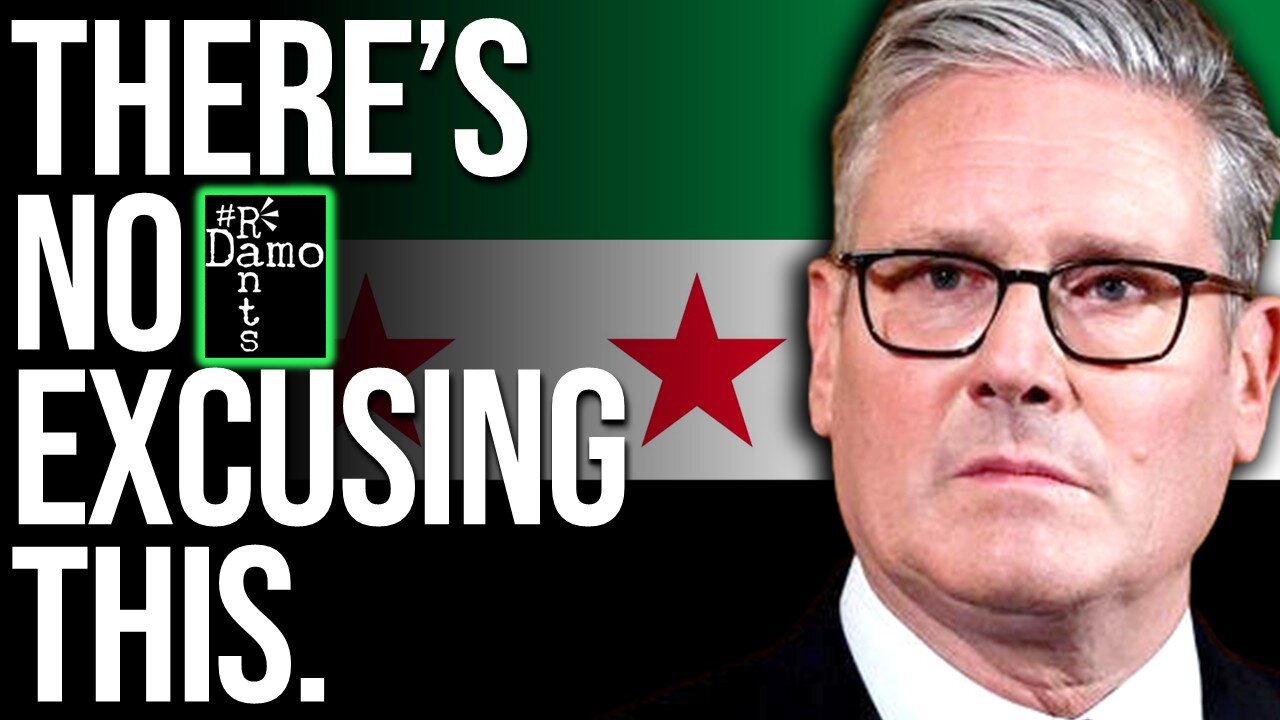
Starmer’s Proscription Hypocrisy Just Blew Up In His Face
Right, so they’ll tell you this is diplomacy. A grown-up government making “necessary adjustments” to deal with “new realities” in Syria. They’ll say we have to be pragmatic now that Hay’at Tahrir al-Sham controls the state. But you only need to look at what the British government actually did to understand what’s going on. They took a group born from the Al-Nusra Front, linked to al-Qaeda until the split in 2014, now governing through executions and mass killings documented by the Syrian Observatory for Human Rights – and they removed its terrorist designation. And at the exact same time of course, Palestine Action remain proscribed, a non-violent direct action movement in Britain for targeting weapons manufacturers. Compare that to HTS, who since seizing power from Assad last December, have apparently killed some 11,000 people amongst ethnic minority groups. If you want to understand British counterterror policy today, the rule is simple: killing civilians is diplomacy; stopping arms exports to Israel is terrorism.
Right, so the break came when the British government removed Hay’at Tahrir al-Sham from the UK’s list of proscribed terrorist organisations in the last week. That was the moment the old assumption stopped working. The assumption that terrorism law is tied to violence. The assumption that proscription is grounded in protecting civilians. The assumption that the state will not recognise power built through killings, disappearances and coercion. That assumption collapsed the instant the Home Office laid the order before Parliament and framed it as a necessary step to “enable engagement” with Syria’s new governing authorities. The language was administrative. The implications were not. A state does not delist an armed group while killings are still being documented unless the purpose of proscription has changed.
This is the point where people who have not followed the evolution of British counterterror law tend to misunderstand what they are looking at. Proscription has never been simply about stopping violence. It has always been a tool for shaping which actors the state permits to operate politically, financially and diplomatically. Who can be met with. Who can be funded. Who can speak. Who can travel. Who is allowed to claim legitimacy. The terrorism label has always been an instrument of statecraft, and statecraft has always been about power – not principle. The delisting of HTS therefore is not an aberration. It is the logical continuation of a state that treats legality as a function of strategic interest.
Hay’at Tahrir al-Sham did not transform itself into a civilian political organisation before the delisting. The leadership did not change. The enforcement structures did not disband. The group’s origins in Jabhat al-Nusra, the Al-Nusra Front, linked to al-Qaeda – functionally the Syrian wing of that group - until the public split announced in 2014, are part of the documented record. The split from ISIS reflected factional conflict within militant networks, not a rejection of armed ideological rule. When HTS assumed control of the Syrian state apparatus following the fall of the Assad government almost a year ago now, it did so through power already held by force. There is no evidence of demilitarisation. There is no evidence of renunciation of coercive governance. The British government did not require evidence of either before removing the terror designation.
This matters because the state has now demonstrated that it will recognise power regardless of how that power was obtained. If a group can seize control of territory, institutions, and state functions, the British government will treat that as sufficient grounds for engagement. Violence does not disqualify. Violence is merely another means of governance so long as the outcomes align with strategic interest. The humanitarian framing of counterterrorism collapses on contact with this decision. The delisting makes no sense if the protection of civilians is the principle. It makes complete sense if the preservation of influence is the principle.
The Syrian Observatory for Human Rights, a British-based monitor with longstanding documentation networks in Syria, reported that nearly eleven thousand people have been killed since HTS took power. The figures include more than eight thousand civilians, among them hundreds of children and hundreds of women. The same reporting recorded more than three thousand deaths as field executions. These deaths did not occur in the past. They occurred during the period in which HTS consolidated state authority. The killings were not incidental to war. They were a method of rule.
It is important here to be precise. The British government did not dispute these figures. It did not attempt to reframe them. It did not suggest that the Observatory’s reporting was unreliable. It did not attempt to provide a counter-narrative. Silence was the admission. The silence mattered because it signalled that the facts themselves were no longer relevant to the determination of legitimacy. What mattered was control. Control is the currency of international recognition. Whoever controls territory and institutions becomes the negotiating partner.
The British government did not claim that the killings had stopped. It did not claim that HTS had undergone internal reform. It removed the terrorist designation regardless. This is the moment where the logic must be stated plainly. The British state did not remove the designation because violence ended. It removed the designation while violence continued. Therefore, proscription is no longer being applied based on whether a group kills civilians. It is being applied based on whether that group is now useful to the British state.
To understand the scale of this shift, it’s worth looking at how HTS constructed the appearance of state legitimacy after taking power. Earlier this month, the new authorities staged a parliamentary process presented as a “step toward democratic normalisation.” But the structure of that vote made its function clear. A majority of seats were allocated through appointed electoral colleges. A further share was to be directly selected by the president, the head of HTS Ahmed Al-Sharaa, formerly known as Abu Muhammad Al-Jolani, complete with $10m US bounty on his head, well, not any more there isn’t. Several regions did not participate at all. This was not a transfer of power to the public. It was the organisation of rule. A parliament that cannot remove the authority that appointed it is not an instrument of representation. It is an instrument of control.
And this is where we need to slow down, because this is the point where the propaganda is disguised as politics. Western governments love the appearance of elections. Elections allow them to tell the public that they are dealing with a democracy, or at least a democracy-in-progress. But a parliament that exists only to affirm the will of an armed executive is not democratic. It is a rubber stamp. The visual theatre of ballot papers and formal seating arrangements is a performance designed to communicate legitimacy externally while maintaining coercive rule internally. Britain recognised the performance.
So when the British state delisted HTS, it was not recognising a democratic transition. It was recognising a governing apparatus that had demonstrated control of the state machinery. Stability here does not refer to peace or safety. Stability refers to predictability for states seeking to maintain influence. Stability means Britain can now speak to one authority, not many. It means intelligence agencies know who to call. It means diplomats know where to go. It means that even if people are being killed, the killing is structured.
This political restructuring was followed by diplomatic elevation. Ahmed al-Sharaa, appeared at the United Nations General Assembly as Syria’s head of state. No Syrian leader had addressed the UNGA in decades. That appearance signalled to other states that the new authorities were being treated as the legitimate political leadership of Syria. And once that signal had been given, delisting in the UK became the legal adjustment required to operate within that diplomatic reality. The sequence is pretty obvious: state power secured → parliamentary structure formalised → international platform granted → Western legal recognition follows. But there’s a price to pay.
Meanwhile, reporting documented the resurgence of ISIS operations in eastern Syria. ISIS no longer functions as a territorial state per se. It has reorganised into dispersed operational cells engaging in ambushes, roadside attacks and targeted killings. Surveillance networks reported that fighters re-armed after accessing weapons depots during the collapse of the prior state structure. Data relayed by the Syrian Democratic Forces counted over one hundred such attacks between January and August of this year. This resurgence did not occur in spite of the new order. It occurred under it. The security environment remains violent and unstable. Yet the British government chose this moment to delist an armed authority.
To expand this point, we need to look directly at how the British state interprets strategic interest. British foreign policy in the region is not organised around humanitarian protection. It is organised around influence, access and alignment. When a government falls and a new authority takes control of a state in which Britain has strategic interests, Britain must decide whether to recognise that authority. Recognition preserves influence. Non-recognition cedes influence to others. The delisting of HTS was the mechanism through which recognition became operationally possible. The British state judged that it needed to maintain engagement with whoever now governs Syria. It therefore adjusted the law to permit that engagement.
This decision was made to maintain strategic positioning, not because HTS ceased to govern through coercion. The British state did not present evidence showing demilitarisation or civilian protection. Instead, it presented the delisting as necessary for diplomacy. The word “necessary” in this context does not refer to the protection of life. It refers to the preservation of state influence.
This is where the domestic hypocrisy becomes unavoidable. At the same time that the British government removed the terrorism designation from HTS, it is of course facing a judicial review having designated Palestine Action as a terrorist organisation. Palestine Action is a UK-based direct action movement that targets the operations of British arms manufacturers supplying Israel. The movement has as we know, conducted property damage and industrial disruption. No deaths have resulted from its actions. Its purpose is to prevent material support to military operations. The state could have prosecuted these actions under existing criminal law. It did not. It used counter-terror law and that’s why they’re in a legal bind over it now.
But this is where the implications become unmistakable.
The state has criminalised non-violent resistance while legitimising armed authority.
The state now shields those who kill and have killed 11,000 people since seizing power and punishes those who try to stop the killing by targeting arms manufacturers.
Terrorism, as defined by the state, by this Starmer regime, no longer refers to the use of violence.
It refers to interference with state-aligned power.
So the message to the public is unambiguous.
If you obstruct the capacity of the British state to maintain its foreign alliances or its weapons export networks, you will be designated a security threat.
This is the collapse of the difference between national security and obedience.
It means protest is only acceptable when ineffective.
It means solidarity is tolerated only when symbolic.
It means dissent is permitted only when it poses no actual friction against state power.
When direct action becomes a threat to strategic interests, the state moves to criminalise it under the most powerful legal framework available. Proscription law allows seizure of assets, extended surveillance and the criminalisation of association. When applied to non-violent movements, it signals that the state no longer distinguishes between political resistance and threat. That surely makes the state itself a threat therefore?
The killings recorded under HTS rule show what the state is willing to accept when it is strategically useful. Nearly eleven thousand deaths since the takeover cannot be dismissed as collateral. They are evidence of the conditions under which authority is being exercised. Britain’s delisting shows it is prepared to accept those conditions. That it’s a price in blood that they accept. The proscription of Palestine Action shows it is prepared to suppress non-violent resistance to those same conditions. Amoral just isn’t a big enough word, its obscene.
This is not mismanagement.
It is not oversight.
It is not contradiction.
It is policy.
They did not fail.
They chose.
And the state believes you will accept this because it believes you have been trained to hear the word terrorism and to stop thinking the moment you hear that word. It believes you will not examine what the law is being used to protect. It believes you will accept violence as long as it is framed as stability. It believes you will accept repression as long as it is framed as security.
The record is clear.
Delisting of an armed authority responsible for mass killing.
Staged parliamentary legitimacy.
International platforming without accountability.
Resurgence of ISIS activity under the new order.
Proscription of a domestic non-violent movement resisting arms supply.
Terrorism law redefined to serve state power.
They think exhaustion will become consent. Are you too exhausted to care about this?
It’s another example of Two Tier Keir at the end of the day isn’t it? One rule for protesters, another rule for religious extremists and Al-Qaeda cast-offs, but it’s happening here too. A British Palestinian doctor suspended from her job over her support for Palestine, yet literal British citizens fighting in the IDF? Tumbleweed from the powers that be on that one. Get all the details of that story in this video recommendation here as your suggested next watch.
Please do also hit like, share and subscribe if you haven’t done so already so as to ensure you don’t miss out on all new daily content as well as spreading the word and helping to support the channel at the same time which is very much appreciated, holding power to account for ordinary working class people and I will hopefully catch you on the next vid. Cheers folks.
-
 LIVE
LIVE
Donald Trump Jr.
2 hours agoAmerican Dominance vs Dems' Delusion | TRIGGERED Ep.287
1,068 watching -
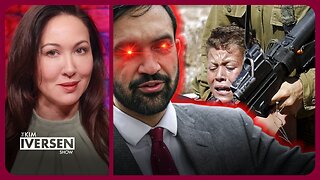 LIVE
LIVE
Kim Iversen
2 hours agoThe World’s Most “Moral” Army — Kills 40 Kids During "Ceasefire" | Socialism's Coming: The Zohran Mamdani Agenda
2,716 watching -

TheCrucible
1 hour agoThe Extravaganza! EP: 63 with Guest Co-Host: Rob Noerr (10/30/25)
20.1K1 -
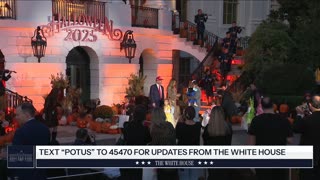 LIVE
LIVE
The White House
4 hours agoPresident Trump and the First Lady Participate in Halloween at The White House
802 watching -

Candace Show Podcast
1 hour agoBREAKING NEWS! The Egyptian Military Was In Provo On 9/10. | Candace Ep 255
9.85K25 -
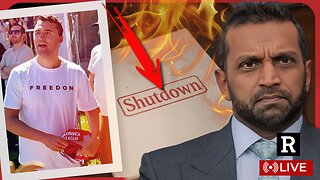 2:12:54
2:12:54
Redacted News
2 hours agoBREAKING! KASH PATEL'S FBI SHUTS DOWN CHARLIE KIRK ASSASSINATION FOREIGN INTEL PROBE BY JOE KENT
87.4K63 -
 LIVE
LIVE
Dr Disrespect
7 hours ago🔴LIVE - DR DISRESPECT - ARC RAIDERS - SOLO RAIDING THE GALAXY
1,281 watching -
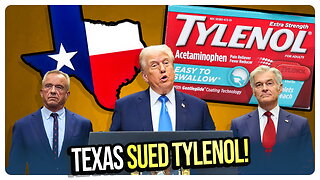 1:12:37
1:12:37
vivafrei
3 hours agoTexas A.G, Sues J&J over Autism Claims! VIva Goes Honeybadger on Liberals! Hasan Piker & MORE!
89.3K36 -
 3:19:22
3:19:22
Barry Cunningham
4 hours agoPresident Trump Talks China | Mike Johnson Shutdown Day 30 | Reacting To JD Vance Questions At TPUSA
24.4K8 -
 LIVE
LIVE
LFA TV
21 hours agoLIVE & BREAKING NEWS! | THURSDAY 10/30/25
916 watching